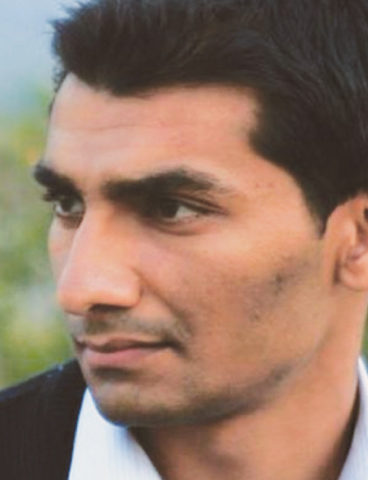Name: Junaid Hafiz
Country/Area of Origin: Multan, Pakistan
Background: Prior to his arrest, Hafiz was a lecturer at Bahauddin Zakariya University in Multan
Reason for Arrest:
In March 2013, Pakistani authorities arrested Hafiz after he was accused of allegedly insulting the Prophet and the Holy Qur’an both verbally and on Facebook.
In 2014, Hafiz’s first legal representative, Rashid Rehman, was targeted for his work on such a contentious case. A group of assailants shot and killed Rehman while he was working in his office in Multan; two of Rehman’s colleagues were injured in the attack but fortunately survived.
Latest Updates:
- On 21 December 2019, a court in Central Jail, Multan – where Hafiz is currently detained in solitary confinement – levied three separate convictions and sentences against Hafiz: life imprisonment for “desecrating the Qur’an”, 10 years’ imprisonment for “intending to outrage religious feelings”, and death for “insulting the Prophet Muhammad”.
- “He’s [Hafiz] been very agitated. He cannot talk very coherently. When I used to meet him in the beginning [of the case], he would meet me with a smile and had a lot of passion … after so many years in solitary confinement, it has an effect on a person.” – Hafiz’s current lawyer, anonymous
- ” [Today’s was] an unfortunate verdict which has less to do with the legal merits of the case and more with the sociopolitical environment in which the lower judiciary operates and for which no one seems to care. The prospect of Hafeez getting even a semblance of fair trial came into question when his counsel Rashid Rehman was brutally murdered inside his chambers. Those involved in the murder were never apprehended. Rehman’s murder resulted in a wave of fear, putting off other lawyers from taking up his defence. The failure to apprehend those who shot Rehman dead signalled impunity for other would-be vigilantes. Could any judge in such circumstances take the risk of doing justice? Those who could were transferred from the district or brought under pressure by groups of lawyers operating as mafias. We feel the case was wholly unnecessarily prolonged defying all legal norms.” Statement from Hafiz’s family and legal team
- “Junaid Hafeez’s death sentence is a gross miscarriage of justice. The verdict of the Multan court is extremely disappointing and surprising. Junaid’s entire case and lengthy trial has been unfair and a travesty.” – Rabia Mehmood, Pakistan Researcher, Amnesty International
- “In five years, at least eight judges have heard Mr. Hafeez’s case, making a fair trial virtually impossible. Meanwhile, he has undergone six years’ imprisonment in solitary confinement. HRCP reposes its faith in the higher judiciary and hopes that the verdict will be overturned in appeal.” – Human Rights Commission of Pakistan
- “In the light of this ruling, the guilty verdict against Mr. Hafeez is a travesty of justice, and we condemn the death sentence imposed on him. We urge Pakistan’s superior courts to promptly hear his appeal, overturn the death sentence and acquit him. The death sentence imposed on Mr. Hafeez has no basis in either law or evidence, and therefore contravenes international law. Carrying out the sentence would amount to an arbitrary killing. […] Mr. Hafeez’s case has gone through lengthy trials in Multan, with the prosecution failing to provide convincing evidence of his guilt. We also note that some documentary evidence submitted to the court was never subjected to independent forensic review despite allegations it had been fabricated, and that a lawyer representing Mr. Hafeez in 2014, Rashid Rehman, was murdered and the killers have not been brought to justice. There seems to be a climate of fear among members of the judiciary handling this case, which may explain why at least seven judges were transferred during this lengthy trial.” – United Nations experts: Mr. Ahmed Shaheed (UN Special Rapporteur on freedom of religion or belief); Ms. Agnes Callamard (UN Special Rapporteur on extrajudicial, summary or arbitrary executions); Mr. Nils Melzer (UN Special Rapporteur on Torture and Other Cruel, Inhuman or Degrading Treatment or Punishment); and Members of the UN Working Group on Arbitrary Detention (Mr. José Antonio Guevara Bermúdez, Ms. Leigh Toomey, Ms. Elima Steinerte, Mr. Seong-Phil Hong, Mr. Sètondji Adjovi)

